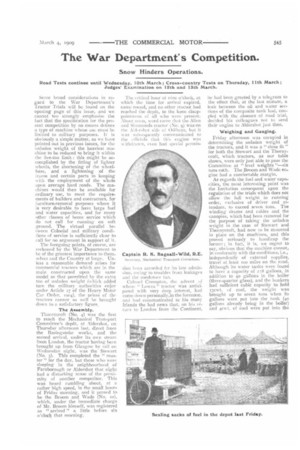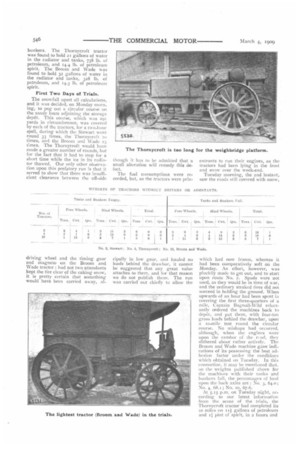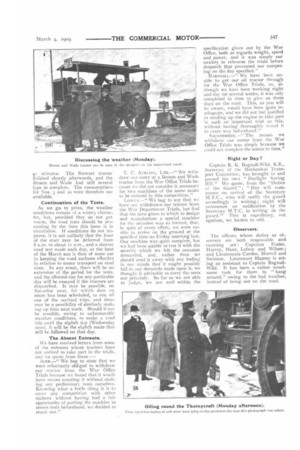The War Department s Competition.
Page 13

Page 14

Page 15

If you've noticed an error in this article please click here to report it so we can fix it.
Snow Hinders Operations.
Road Tests continue until Wednesday, 10th March; Cross-country Tests on Thursday, 11th Judges' Examination on 12th and 13th March. March ; Some broad considerations in regard to the War Department's Tractor Trials will be found on the opening page of this issue, and we cannot too strongly emphasise the fact that the specification for the present competition by no means defines a type of machine whose use must be limited to military purposes. It is obviously a simple matter, as we have pointed out in previous issues, for the unladen weight of the heaviest machine to be reduced to bring it within the five-ton limit : this might be accomplished by the fitting of lighter wheels, the shortening of the wheelbase, and a lightening of the frame and certain parts in keeping with the employment of the whole upon average hard roads. The machines would then be available for -ordinary use, to meet the requirements of builders and contractors, for furniture-removal purposes where it is very desirable to have large fuel and water capacities, and for many other classes of home service which do not call for running on soft ground. The virtual parallel be-. tween Colonial and military conditions of service is sufficiently clear to call for no argument in support of it.
The foregoing points, of course, are reckoned by the War Department to he of the greatest importance to themselves and the Country at large. Unless a reasonable demand arises for commercial tractors which are in the main constructed upon the same model as that permitted by the extra ton of tmladen weight (which added tare the military authorities enjoy under Article 17 of the Heavy Motor Car Order. 1004), the prices of the tractors cannot so well he brought down to a satisfactory figure.
The Assembly.
Thornycroft (No. 4) was the first to reach the Mechanical Transport Committee's dep8t, at Aldershot, on Thursday afternoon last, direct from the Basingstoke works, and the second arrival, under its own steam from London, the tractor having been brought up from Glasgow by rail on Wednesday night, was the Stewart (No. 3). This completed the "muster " for the day, but those who were sleeping in the neighbourhood of Farnborough or Aldershot that night had a disturbing sense of the proximity of another competitor. This was heard rumbling about, at a rather high speed, in the small hours of Friday morning, and it proved to be the Broom and Wade (No. to), which, under the immediate charge of Mr. Broom himself, was registered as " arrived " a little before six o'clock that morning.
The critical hour of nine o'clock, at which the time for arrival expired, came round, and no other tractor had reached the depot, to the keen disappointment of all who were present. About noon, word came that the Allen and Simmonds tractor (No. 9) was on the Alder-:hot side of Odiham, but it was slibequently communicated to the galicials that this engine was withdrawn, even had special permis sion been accorded fcr its late admission, owing to troubles from leakages and the condenser ran.
Colonel Crompton, Ihe advent of whose •` Lowca " tractor was anticipated with very deep interest, had come down personally,in the forenoon, and had communicated to his many friends the bad news that, on his teturn to London from the Continent, he had been greeted by a telegram to the effect that, at the last minute, a leak between the oil and water sectiops of the composite tank had, coupled with the absence of road trial, decided his colleagues not to send their engine to Aldershot just then.
Weighing and Ganging.
Friday afternoon was occupied in determining the unladen weight of the tractors, and it was a " close fit " for both the Stewart and the Thornycroft, which tractors, as our table shows, were only just able to pass the Committee at "level weights "—six tons ea'ch. The Beoona and Wade engine had a comfortable margin.
As regards the fuel and water capacities, the most interesting point was the limitation consequent upon the regulation of the trials which does not allow the full weight in running order, exclusive of driver and attendant, to exceed seven tons. The winding drums and cables and the canopies, which had been removed for the purpose of taking the unladen weight in the case of Stewart and Thornycroft, had now to be mounted in place on the machines, and this proved seriously to handicap the former; in fact, it is, we regret to say, obvious that the machine cannot, in conformity with the conditions, i.e., independently of external supplies, travel at least too miles on the road. Although its water tanks were found to have a capacity of 2 18 gallons, .in addition to 40 gallons in the boiler (three-quarter glass), and the bunkers had sufficient cubic capacity to hold t3cwt. if coal, the weight was brought up to seven tons when So gallons were put into the tank (40 gallons already being in the boiler) and 4cwt. of coal were put into the bunkers. The Thornycroft tractor was found to hold 21 gallons of water in the radiator and tanks, 738 lb. of petroleum, and 14.4 lb. of petroleum spirit. The Broom and Wade was found to hold 32 gallons of water in the radiator and tanks, 328 lb. of petroleum, and 14.3 lb. of petroleum spirit.
First Two Days of Trials.
The snowfall upset all calculations, and it was decided, on Monday morning, to peg out a circular course on the sandy loam adjoining the storage depot. This course, which was 291 yards in circumference, was covered by each of the tractors, for a two-hour spell, during which the Stewart went round 33 times, the Thornvcroft 20 times, and the Broom and Wade 23 times. The Thornycroft would have made a greater number of rounds, but for the fact that it had to stop for a short time while the ice in its radiator thawed. Our only other observation upon this prefatory run is that it served to show that there was insufficient clearance between the off-side
driving wheel and the timing gear and magneto on the Broom and Wade tractor : had not two attendants kept the tire clear of the caking snow, it is pretty curtain that something would have been carried away, al though it has to be admitted that a small alteration will remedy this defect.
The fuel consumptions were recorded, but, as the tractors were prin
cipally in low gear, and hauled no loads behind the drawbar, it cannot be suggested that any great value attaches to them, and for that reason we do not publish them. The run was carried out chiefly to allow the entrants to run their engines, as the tractors had been lying in the frost and snow over the week-end.
Tuesday morning, the and instant, saw the roads still covered with snow,
which had now frozen, whereas it had been comparatively soft on the Monday. An effort, however, was pluckily made to get out, and to start upon route No. 2. Spuds were not used, as they would be in time of war, and the ordinary straked tires did not succeed in holding the ground. When upwards of an hour had been spent in covering the first three-quarters of a mile, Captain Bagnall-Wild reluctantly ordered the machines back to depot, and put them, with four-ton gross loads behind the drawbar, upon' a to-mite test round the circular course. No mishaps had occurred, although, when the engines were upon the camber of the read, they slithered about rather actively. The Broom and Wade machine gave indications of its possessing the best adhesion factor under the conditions which obtained on Tuesday. In this connection, it may be mentioned that, on the weights published above for the machines with their tanks and bunkers full, the percentages of load upon the back axles are : No, 3, 64.0; No. 4, 68.1; ND. IO, 67.6. At 5.15 p.m. on Tuesday night, according to our latest information from the scene of the trials, the Thornycroft tractor had completed its so miles on si gallons of petroleum and II pint of spirit, in 2 hours and
4! minutes. The Stewart tractor finished shortly afterwards, and the Broom and Wade had still several laps to complete. The consumptions for Nos. 3 and to were therefore not available.
Continuation of the Tests.
As we go to press, the weather conditions remain of a wintry character, but, provided they do not get worse, the road tests should be proceeding by the time this issue is in circulation. If conditions do not improve, it is not unlikely that the hour of the start may be deferred from 8 a.m. to about it a.m., and a shorter road test made each day, as the heat of the March sun is then of some use in keeping the road surfaces effective in relation to motor transport on steel tires. In any event, there will be no extension of the period for the tests, and the allotted run for any particular day will be essayed if the tractors are dispatched. It may be possible, on Saturday next, for which date co route has been scheduled, to run off one of the omitted trips, and there may be a possibility of similarly making up time next week. Should it not be possible, owing to unfavourable weather conditions, to make a road trip until the eighth dAy (Wednesday next), it will be the eighth route that will he followed on that day.
The Absent Entrants.
We have received letters from some of the entrants whose tractors have not arrived to take part in the trials, and we quote from these :— ACRR.—" We beg to state that we were reluctantly obliged to withdraw our tractor from the War Office Trials because we found that it would have meant entering it without making any preliminary tests ourselves. Knowing what a futile thing it is to enter any competition with other makers without haying had a fair opportunity of putting the machine to severe tests beforehand, we decided to stand out." T. C. AVELINO, LTD.—" We withdrew our entry of a Broom and Wade tractor from the War Office Trials because we did not consider it necessary for two machines of the same make to be entered in this competition."
' LOWCA.—" We beg to say that we have not withdrawn our tractor from the War Department Trials, but find that the time given in which to design and manufacture a special machine for the occasion was so limited, that, in spite of every effort, we were unable to arrive on the ground at the specified time on Friday morning last. Our machine was quite complete, but we had been unable to test it with the severity which we felt the occasion demanded, and, rather than we should send it away with any feeling in our minds that it might possibly fail in any demands made upon it, we thought it advisable to carry the tests out privately. So far as we are able to judge, we are well within the specification given out by the War Office, both as regards weight, speed and power, and it was simply our anxiety to rehearse the trials before despatch that prevented our competing on the day specified." MARSI1ALL.—" We have been unable to get our oil tractor through for the War Office Trials, as, although we have been working night and day for several weeks, it was only completed in time to give us three days on the road. This, as you will be aware, would have been quite inadequate, and we did not feel justified in sending up the engine to take part in such an important trial as this, without having thoroughly tested it in every way beforehand."
SAUNDERSON.—" The reason we withdrew our motor from the War Office Trials was simply because we could not complete the motor in time."
Night or Day ?
Captain R. K, Bagnall-Wild, R.E., Secretary of the Mechanical Transport Committee, has brought in and passed his own "Daylight Saving Bill." We quote, from the "Duties of the Guard "; " Day will commence on arrival of the Secretary NI.T.C., who will notify the guard accordingly in writing ; night will commence on notification by the Secretary M.T.C. in writing to the guard." This is expediency, not egotism, we hasten to add.
Observers.
The officers whose duties as observers are both responsible and exacting are : Captains Foster, Harvey, Hunt, Lefroy and Wilson ; and Lieutenants Carden, Morrell arid Swinton. Lieutenant Blarney is acting as assistant to Captain BagnallWild. It has been a rather wearisome task for them to "hang around," owing to the bad weather, instead of being out on the road.
























